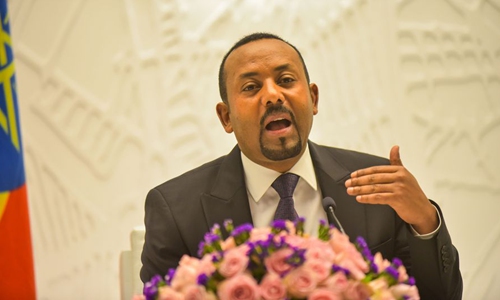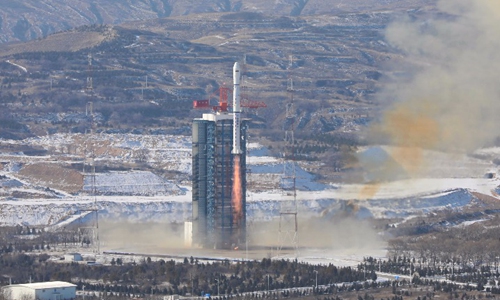HOME >> WORLD
Yearender: Ethiopia bids farewell to historic year with Nobel Peace Prize, maiden satellite
Source:Xinhua Published: 2019/12/27 11:19:27

Abiy Ahmed Ali, Ethiopian Prime Minister, speaks during a press conference on regional and national issues in Addis Ababa, capital of Ethiopia, Aug. 2, 2019. Photo: Xinhua
With the year 2019 coming to a close, winning the Nobel Peace Prize by Ethiopia's Prime Minister Abiy Ahmed Ali and the recent launching of Ethiopia's maiden satellite into space have ignited hope of further socio-economic and technological advancements in 2020.
The East African country would warmly recognize the concluding 2019 as a historic year, mainly due to these positive developments in the country.
NOBEL PEACE PRIZE INJECTS NEW IMPUTES IN SUSTAINING PEACE IN ETHIOPIA, BEYOND
The Nobel Peace Prize, awarded by the Norwegian Nobel Committee to Ahmed "for his efforts to achieve peace and international cooperation, and in particular for his decisive initiative to resolve the border conflict with neighboring Eritrea," had come at a critical time as the rapprochement of ties among Ethiopia and fellow Horn of African countries ignited hope of new beginning to the fragile Horn of Africa region.
Upon announcing Ahmed's winning of this year's Nobel Peace Prize, the Norwegian Nobel Committee in a press statement issued on Oct. 11 stressed that "the prize is also meant to recognize all the stakeholders working for peace and reconciliation in Ethiopia and in the East and Northeast African regions."
Describing the Ethiopian premier's Nobel Peace Prize winning as "a timeless testimony to the main ideals of unity, cooperation and mutual coexistence that Ahmed has been consistently championing," the Ethiopian PM's Office also stressed that the steps taken to amend the broken relations between Ethiopia and Eritrea have been "critical to regional stability and integration in the spirit of Medemer (Amharic word for synergy)."
In addition to the recognition's positive implications to the fragile Horn of Africa region as it was the first-ever Nobel Peace Prize that was ever awarded to an East African personality, many analysts also stressed that the phenomenon would inject a positive imputes in solving Ethiopia's own internal conflicts.
According to the UN migration agency, in 2018, Ethiopia recorded the third highest number of new displacements worldwide, with some 3,191,000 Internally Displaced Persons across the country. A significant portion of these displacements are conflict-induced, largely related to ethnic and border-based disputes.
On Dec. 10, Ahmed told the Nobel Peace Prize award ceremony in Oslo, capital of Norway his resolve to bring sustainable peace and solidarity in Ethiopia, in particular, and across the Horn of Africa region.

Ethiopia's first-ever satellite, known as ETRSS-1, is launched on a Long March-4B carrier rocket at Taiyuan Satellite Launch Center in north China's Shanxi Province on Dec. 20, 2019. Photo: Xinhua
MAIDEN SATELLITE BOOSTS ETHIOPIA'S COMPETITIVENESS
Just last week, Ethiopia - Africa's second populous nation next to Nigeria with some 105 million total population - launched a wide-range multispectral remote-sensing microsatellite, dubbed ETRSS-1, that was sent into space by a Long March-4B carrier rocket from the Taiyuan Satellite Launch Center in north China's Shanxi Province.
The satellite, which is expected to monitor the environment and weather patterns for better agricultural planning, drought early warning, mining activities and forestry management of the country, also ignited new expectations as the East African country becomes one of the few African countries to have their own dedicated satellite.
The Ethiopian premier, in his televised address to the nation upon the launch of the country's maiden satellite to space, heralded the start of a historic moment in Ethiopia's quest towards the development of space science sector.
"I believe that this satellite, which was registered as the first-ever satellite to be launched to orbit in our country's history, will not be the last as it will be followed by many others in the future," Ahmed added.
Noting that the East African country had been forced to purchase satellite data and image from others due to lack of dedicated Ethiopian satellite thus far, Ahmed stressed that the latest launched satellite would enable the country to carefully follow large-scale projects across the country.
Ahmed also stressed that the satellite "will play a crucial role in modernizing our agriculture sector by creating conducive environment through the provision of scientific data and knowledge."
He added that it will also inject a much-needed capacity for the country to compete and penetrate African and global market.
Noting that China has provided funding support for the project, Ahmed stressed that project had transferred knowledge to Ethiopian experts who have been able to take part "from design to production" in the satellite project.
The newly launched satellite also brings joy to Ethiopians both at home and abroad as many Ethiopian social media users have been posting, with pictures and captions, following the successful launch of the country's first ever satellite into space.
Ethiopians had called for capitalizing on the two notable achievements to leapfrog Ethiopia's status in various other socioeconomic sectors.
Posted in: AFRICA